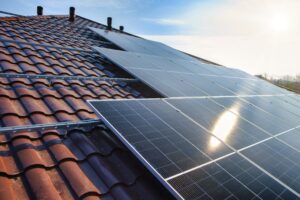Smart meters are being installed across the UK in a bid to reduce household carbon emissions, and more than half of homes now have one. Smart meter advocates claim the technology has widely recognised benefits. But others view the new digital meters with suspicion.
Consumer concerns following technical glitches have resulted in the UK falling behind some other countries in the adoption of next-generation meter reading. But with energy costs now rising again, by an average 10 percent for the last quarter of 2024, more households may start thinking about saying yes to intelligent metering.
If you’re considering switching to a smart meter, this post examines the pros and cons to help you decide whether it’s the right move.
What Are Smart Meters?
Smart meters are being installed free of charge in homes across the UK in a multi-billion-pound rollout designed to change how we use energy and pay for it.
Smart meter technology has been around since 1974. Fifty years on, the government and experts in the energy industry see smart meters as a critical tool to combat climate change and save money on energy bills.
Like a traditional meter, smart meters keep track of household energy use. You get one meter each for gas and electricity. But advanced digital metering has two key differences.
- Smart meters have an in-home display (IHD) so you can see how much electricity and gas you’re using in real time. Particularly helpful for homes with solar panels who want to use their electricity in the most efficient way possible.
- They connect wirelessly to your energy supplier and automatically send them readings.
Smart meters are being installed by large energy providers, and by February 2024, 60 percent of UK households had one.
According to the Energy Saving Trust, intelligent metering results in accurate energy bills. But not all consumers are happy with their automated meter reading (AMR) technology. A survey by price comparison and switching service Uswitch found that only 66 percent of households with a smart meter were satisfied with it.
Advantages of Smart Meters
Smart meters give consumers real-time data on how much electricity and gas they’re using. Supporters of advanced metering technology say this enables households and businesses to make better decisions on their energy use, potentially cutting costs and reducing their carbon footprint.
Some surveys point to better energy use habits by more than 80 percent of smart meter users, and some energy companies offer cheaper tariffs exclusively to customers with smart meters. They’re also very popular with solar panel owners.
Accuracy
Smart meters eliminate the need for manual readings or estimated bills. They have to be officially approved and their accuracy is monitored.
There are now almost 35 million smart meters in Britain, according to Smart Energy GB. The organisation, which supports automated metering, says the vast majority of smart meters are operating correctly and are as accurate as conventional meters. Other smart meter advocates claim the technology is more accurate than a traditional meter.
Fairer Bills
Older meters can result in billing problems. Manual readings aren’t always accurate. It’s easy to make mistakes when taking and reporting the figures, and some householders find the task inconvenient, particularly if their meters are in places difficult to access.
And if you don’t remember to keep sending the data to your energy provider, they have to work on estimated bills. A smart meter records your energy use in real time and sends the data directly to the energy company. Your bills then reflect actual energy consumption, so you only pay for what you use.
Better Energy Management
Smart meter in-home displays can increase awareness of how much energy you’re using at any given time – useful for those relying on their own solar technology. This makes household energy management more user-friendly and straightforward.
Smart meter supporters claim the technology has enabled 86 percent of users to modify their energy use habits for the better, reducing both their energy costs and carbon footprint. Homes are currently responsible for around 17 percent of the UK’s carbon emissions, so any reduction in energy use is bound to be welcome.
Benefits of Smart Meters for Solar
Solar panels, with or without a smart meter, cut household electricity bills and reduce carbon emissions. If you’re thinking about going solar, a smart meter will give you additional key benefits.
Meter readings will be sent automatically to your mains electricity supplier, and it’s easier to keep track of your energy consumption and control energy use. Furthermore, you’ll be able to earn money from the solar electricity you don’t use, with access to the best solar export deals.
Smart Meters and the Smart Export Guarantee
A smart meter tracks how much electricity you draw from the National Grid and the excess energy produced by your solar panels. This helps you maximise the benefits of your solar investment. Under the government-backed Smart Export Guarantee (SEG), you can sell surplus solar energy to the grid through your energy supplier.
All you need to get started is a meter that provides export readings every 30 minutes – typically a smart meter.
Some estimates suggest SEG payments of up to £600 a year are possible with the average 5kWp (kilowatt peak) solar panel system plus battery.
SEG-licensed energy companies set their own export tariffs, which can be either fixed or variable. Some fixed tariffs pay up to 15p a kilowatt hour (kWh) or more. Variable rates change according to market demand, so it’s best to do your research before signing any SEG deals.
Disadvantages of Smart Meters
The smart meter rollout has been controversial and plagued by multiple setbacks and missed targets, and the government has admitted that by the end of 2023 nearly four million smart meters in Britain weren’t working in smart mode. This may mean customers relying on estimated bills, being overcharged, and then struggling to get their money back.
A smart meter won’t necessarily cut energy bills and reduce carbon emissions. The technology in itself doesn’t reduce the amount of gas and electricity you use. Many smart meter sceptics say they don’t believe the technology is secure and may put their data at risk.
Further concerns are around obsessive energy monitoring and higher energy bills through surge pricing.
Smart Meter Anxiety
Some people may get obsessive about checking their smart meter in-home display, especially when energy prices rise, as they’re now doing from October to December 2024.
Smart meter critics say that constantly monitoring smart meters can lead to tension and arguments about energy use among families, resulting in stress and anxiety that negatively impacts mental health.
One survey found that consumers were checking their smart meters four times a day on average, but 10 percent looked at the in-home display nearly every waking hour.
Surge Pricing
Plans are in the pipeline to introduce surge pricing with smart meters from 2025.
Surge pricing – or time-of-use pricing – allows consumers to get cheaper energy when the National Grid is less busy. But energy providers can charge more when demand peaks – when the National Grid is most busy.
Ofgem claims surge pricing will save households money in the long term but critics say it penalises consumers for using electricity when they need it most.
Smart Meter Rollout Problems
In 2011, the government announced its aim for every home and small business to have a smart meter installed. It intended to achieve this by 2019. But the Department for Energy Security and Net Zero (DESNZ) has had to repeatedly push back its advanced metering targets and timeframes.
In 2022, the government mandated energy suppliers to invest more in the smart meter rollout. Those who failed to meet targets faced heavy financial penalties from energy regulator Ofgem (Office of Gas and Electricity Markets).
However, by 2023 it turned out that many smart meters weren’t working properly while others were losing functionality as communications networks were upgraded. This negatively impacted public support for advanced metering.The same year, six major energy companies were fined a total of £10.8 million after missing their next-gen metering targets.
In October 2023, a House of Commons Committee update on the smart meter rollout concluded that progress was too slow and the DESNZ was failing to convince the public of intelligent metering advantages.
The current target is for eight in ten homes to have a smart meter by the end of 2025.
Are Smart Meters Compulsory?
Most energy companies no longer install old-style meters. But you don’t need to have a smart meter unless your old meter is faulty or at the end of its lifespan.
Once a smart meter is installed, you can’t switch back to a conventional meter. If you don’t like smart meter technology, you can ask your energy supplier to put your meter in dumb mode. It will then lose smart functionality and work like an old meter.
Is a Smart Meter Worth It for You?
Switching to intelligent metering is generally seen as a good move. Smart meters are free and two-thirds of households who’ve installed one are happy with it.
Intelligent metering can’t cut energy costs or reduce carbon emissions on its own but access to real-time readings can help you manage your energy use more effectively. And you’ll never have to take a manual reading again.
Initial glitches with connected metering technology are being addressed with advances such as artificial intelligence (AI) and improvements in connectivity and automation.
However, many people remain sceptical about smart meters, especially with surge pricing on the horizon, and some households get obsessive about constantly monitoring their energy use.
If you have solar panels, pairing it with a smart meter is definitely worth it. You’ll open up the opportunity to make money under the Smart Export Guarantee. Find out more about smart meters with solar panels.
- Create a Tailored Quote Based On Your Circumstances
- Takes Less Than 2 Minutes
- Fixed-Online Quotes




